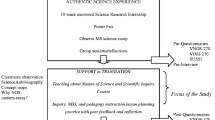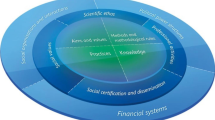Abstract
This study explored the nature of science (NOS) assessments K-4 classroom teachers developed for measuring students’ understandings of NOS elements. We used the Views of Nature of Science Questionnaire-Form VNOS-D2 (Views of Nature of Science Elementary School Version 2) and interviews to verify that teachers’ conceptions of NOS were sufficient to enable them to teach and assess NOS. We collected copies of teachers’ action research designs, lesson plans, and assessment tools, conducted classroom observations and made field notes of their science instruction and assessments. We videotaped conversations at monthly workshops to note discussion surrounding teaching and assessing NOS in K-4 classrooms. We found that experienced teachers designed a variety of strategies for assessing NOS conceptions that differed by grade level.









Similar content being viewed by others
References
Akerson, V. L., & Abd-El-Khalick, F. S. (2003). Teaching elements of nature of science: A year long case study of a fourth grade teacher. Journal of Research in Science Teaching, 40, 1025–1049.
Akerson, V. L., Cullen, T. A., & Hanson, D. L. (2009). Fostering a community of practice through a professional development program to improve elementary teachers’ views of nature of science and teaching practice. Journal of Research in Science Teaching, 46, 1090–1113.
Akerson, V. L., & Donnelly, L. A. (2010). Teaching nature of science to K-2 students: What understandings can they attain? International Journal of Science Education, 32, 97–124.
Akerson, V. L., Hanson, D. L., & Cullen, T. A. (2007). The influence of guided inquiry and explicit instruction on K-6 teachers’ views of nature of science. Journal of Science Teacher Education, 18, 751–772.
Akerson, V. L., & Hanuscin, D. L. (2007). Teaching nature of science through inquiry: The results of a three-year professional development program. Journal of Research in Science Teaching, 44, 653–680.
Akerson, V. L., & Volrich, M. (2006). Teaching nature of science explicitly in a first grade internship setting. Journal of Research in Science Teaching, 43, 377–394.
Bell, R. (2008). Teaching the nature of science through process skills: Activities for grades 3–8. Boston: Pearson.
Bogdan, R. C., & Biklen, S. K. (2003). Qualitative research for education (4th ed.). Boston: Allyn & Bacon.
Carey, S., & Smith, C. (1993). On understanding the nature of scientific knowledge. Educational Psychologist, 28, 235–251.
Culham, R. (2003). 6 + 1 traits of writing: The complete guide (Grades 3 and Up). Jefferson City, MO: Scholastic Professional Books.
Driver, R., Asoko, H., Leach, J., Mortimer, E., & Scott, P. (1994). Constructing scientific knowledge in the classroom. Educational Researcher, 23(7), 5–12.
Enger. S., & Yager, R. (2000). Assessing student understanding in science: A standards-based K-12 handbook. Thousand Oaks, CA: Corwin Press.
Gearhardt, M., Nagashima, S., Pfotenhauer, J., Clark, S., Schwab, C., Vendlinski, T., et al. (2006). Developing expertise with classroom assessment in K-12 science: Learning to interpret student work. Interim findings from a two-year study. Educational Assessment, 11, 237–263.
Hubbard, R., & Power, B. (1993). The art of classroom inquiry: A handbook for teacher researchers. Portsmouth, NH: Heinemann.
Khishfe, R., & Abd-El Khalick, F. S. (2002). Influence of explicit and reflective versus implicit inquiry oriented instruction on sixth graders’ views of nature of science. Journal of Research in Science Teaching, 39, 551–578.
Lederman, N. G. (1999). Teachers’ understanding of the NOS and classroom practice: Factors that facilitate or impede the relationship. Journal of Research in Science Teaching, 36, 916–929.
Lederman, J. S., & Khishfe, R. (2002). Views of nature of science, form D2. Illinois Institute of Technology, Chicago, IL (unpublished paper).
Marcos, J., Sánchez, E., & Tillema, H. (2008). Teachers reflecting on their work: Articulating what is said about what is done. Teachers & Teaching, 14, 95–114.
McDermott, L. C., & the Physics Education Group at University of Washington. (1996). Physics by inquiry. New York: Wiley.
Mohr, L. L. (1995). Teaching diverse learners in inclusive settings: Steps for adapting instruction. A paper presented at the 73rd annual meeting of the Council for Exceptional Children, Indianapolis, IN.
National Science Teachers Association. (2000). NSTA position statement: The nature of science. Retrieved December 12, 2008, from http://www.nsta.org/159&psid=22.
Palmer, D., Stough, L., Burdenski, J., & Gonzales, M. (2005). Identifying teacher expertise: An examination of researchers’ decision making. Educational Psychologist, 40, 13–25.
Putnam, R. T., & Borko, H. (2000). What do new views of knowledge and thinking have to say about research on teacher learning? Educational Researcher, 29(1), 4–15.
Schwartz, R., & Lederman, N. G. (2002). “It’s the nature of the beast:” The influence of knowledge and intentions on learning and teaching nature of science. Journal of Research in Science Teaching, 39, 497–521.
Shulman, L. (1987). Knowledge and teaching: Foundations of the new reform. Harvard Educational Review, 57, 1–22.
Smith, K. A. (1999). Science process assessment for elementary school students (3rd ed.). State College, PA: Smith & Wellever Educational Services.
Smith, C. L., Maclin, D., Houghton, C., & Hennessey, M. G. (2000). Sixth grade students’ epistemologies of science: The impact of school science experiences on epistemological development. Cognition and Instruction, 18, 349–422.
Wagner, K. (2006). Benefits of reflective practice. Leadership, 36, 30–32.
Wenger, E. (1998). Communities of practice: Learning, meaning and identity. New York: Cambridge University Press.
Acknowledgment
The research in this paper was supported by Indiana’s Improving Teacher Quality grant program and Indiana University’s Center for Evaluation and Education Policy.
Author information
Authors and Affiliations
Corresponding author
About this article
Cite this article
Akerson, V.L., Cullen, T.A. & Hanson, D.L. Experienced Teachers’ Strategies for Assessing Nature of Science Conceptions in the Elementary Classroom. J Sci Teacher Educ 21, 723–745 (2010). https://doi.org/10.1007/s10972-010-9208-x
Published:
Issue Date:
DOI: https://doi.org/10.1007/s10972-010-9208-x




